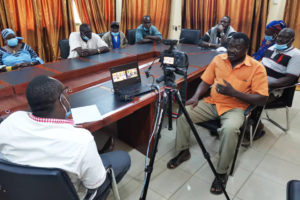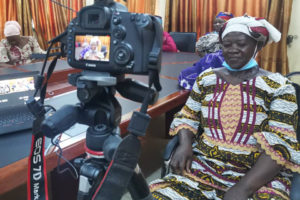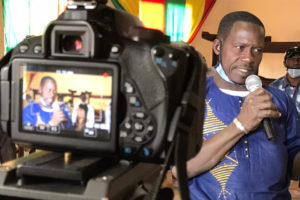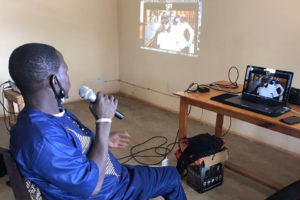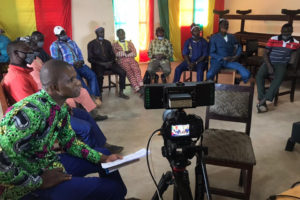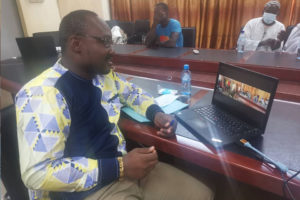Interpeace introduces online peacebuilding for cross-border communities in West Africa
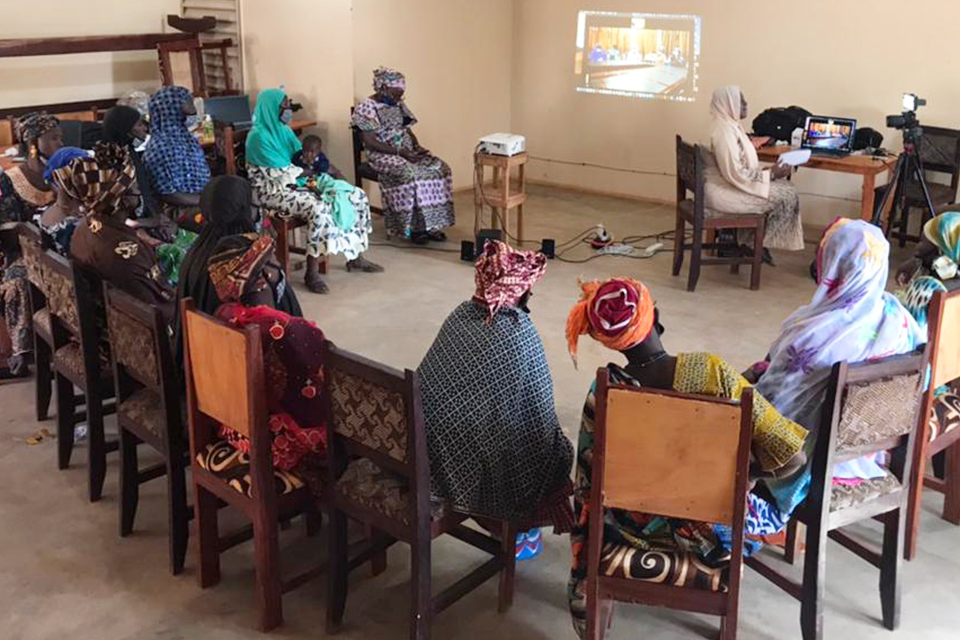
In normal times, Interpeace teams will be facilitating physical dialogue between communities along the Mali-Burkina Faso border to help them resolve their conflicts peacefully. But, with the restrictions imposed by countries to contain the spread of Covid-19, Zoom has become the new platform for dialogue between remote communities.
“Even if the ideal situation was to be able to bring people together in dialogue spaces where they can physically interact, having these meetings via Zoom has been a challenging but successful alternative to overcome the constraints imposed by Covid-19,” said Yann Marius Soma, Researcher at Interpeace Burkina Faso.
The surge in disputes over resources and the emergence of local autonomous defence groups in the Sikasso-Hauts Bassins region that stretches from southeast Mali to western Burkina Faso, has raised fears of major violent confrontations. Because of the rising tensions between communities across the border and the limited presence of national security and defence forces in the region, Interpeace started implementing a cross-border peacebuilding project, in January 2020, to foster social cohesion and prevent the violence.
The Covid-19 pandemic has, however, disrupted some physical activities of this integrated peacebuilding initiative by depriving people of on-site interactions. Today, these activities have moved online to maintain social contact and improve cohesion between the communities even as they keep a safe physical distance.
- Online cross-border focus group with Koloko participants in Orodara, Burkina Faso. Photo credit: Mahamadi Ouedraogo for Interpeace
- Woman speaks at the homogeneous online cross-border focus group in Orodara, Burkina Faso.Photo credit: Mahamadi Ouedraogo for Interpeace
“The teleconferences offered our research team a space to continue the cross-border consultations which started one year ago. This first experience needs to be consolidated to resolve the challenges related to travel restrictions on both sides of the border during this Covid-19 pandemic,” said Fatoumata Mah Traoré. Researcher at the Institut Malien de Recherche Action pour la Paix (IMRAP).
A total of 164 people from four communes in Mali and Burkina Faso have participated in the virtual dialogue sessions. Eighty-five of the participants came from Napasso, Bezansso, Kohony, Hèrèmakono, Kouloukan and Missidougou – which are all remote villages in the Danderesso and Finkolo communes in Mali. The other 79 participants were from Koloko, Sifarasso, Sintasso, Sindo, Gondaga and Fanfiélà villages in the communes of Koloko and Sindo in Burkina Faso.
“Talking to each other through teleconference did not stop us from expressing ourselves or from dialoguing with our brothers in Mali. Everything we said this morning came from the heart. Even in front of the Malians, that is exactly what we were going to say,” explained Traoré Adama, who represented the chief of Sindo village.
- A participant at an online cross border focus group in Sikasso, Mali. Photo credit: Seydou Diallo for IMRAP
- Photo credit: Seydou Diallo for IMRAP
He added: “Considering the tension that started building up during the discussion, if we had met physically, the anger would have taken hold of some people. The dialogue today was really good as it happened.”
Our teams in Mali and Burkina Faso have sometimes struggled with logistical challenges – be it poor internet connection or difficulty facilitating these online meetings at a distance – but have constantly adapted to overcome them.
“I thank you for this initiative. Facilitating a virtual meeting between the different border villages is proof of your commitment to the success of this project. We have used this space to express ourselves without crossing the border,” said Sidiki Dao, one of the participants in Mali.
The teleconferences were organised in a two-phase series. The first phase was from 15 to 18 February and the second from 23 to 26 February 2021. In total, eight focus groups participated in the meetings online, engaging in discussions that lasted four hours a day.
This two-year cross-border peacebuilding initiative was launched in January 2020 and is being implemented in partnership with the Institut Malien de Recherche Action pour la Paix (IMRAP), with the financial support of the PATRIP Foundation.
- Nampasso participants at online cross-border focus group in Sikasso, Mali. Photo credit: Seydou Diallo for IMRAP.
- Yann Marius Soma Yann, Interpeace researcher facilitating an online cross-border focus group in Orodara, Burkina Faso. Photo credit: Mahamadi Ouedraogo for Interpeace.
